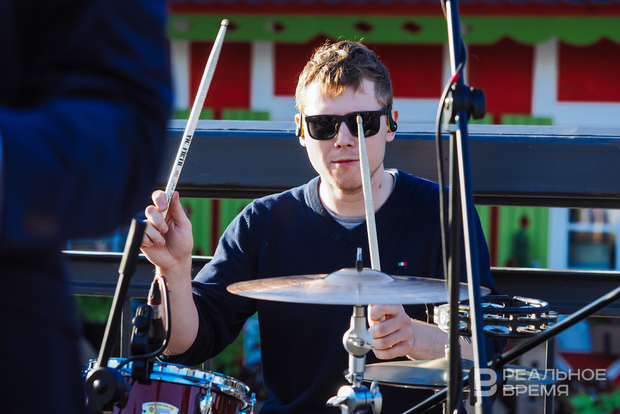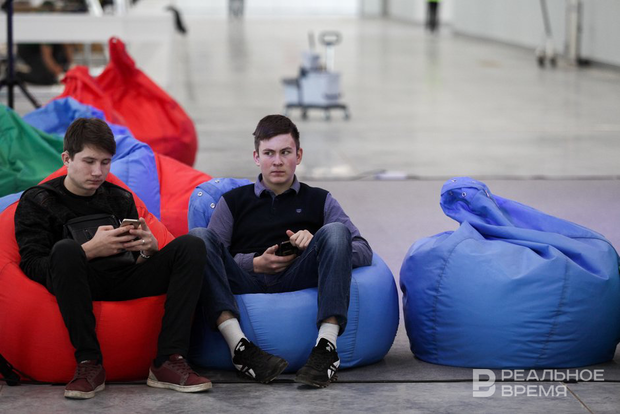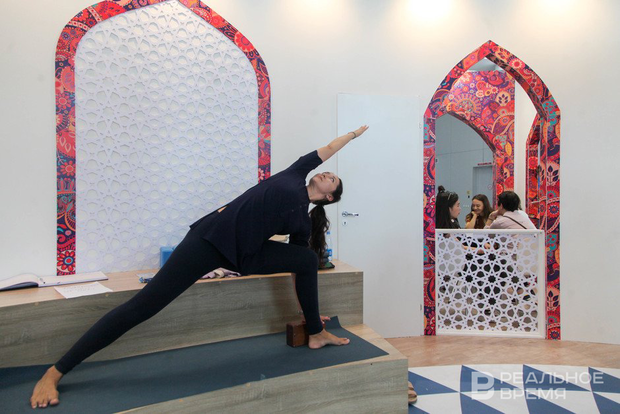Why nothing makes us happy, according to neurophysiologist. Part 2
What 10 thousand steps save us from, who really needs school grades, why one shouldn't help whiners, and whether it is possible to “appoint yourself happy”

In a podcast of Realnoe Vremya, neurophysiologist Yelena Pantyukhina, a teacher, creator of educational events, lecturer, co-author of Immersion Neuropedagogics course, talks with Anna Saushina about why nothing makes us happy. The second part of the transcript of this conversation is about why we need reflexes, how not to kill curiosity in a child, whether it is possible to force ourselves to see the good in life, and why to do it, and also about how to literally run for joy.
Dominant formation: which is stronger — cartoons or work?
I would like to return to the question of how we deceive ourselves. I remembered a quote from Carnegie: “Act as if you were already happy and that will tend to make you happy.” Does this scheme work?
It does. It's not really Carnegie. He just figured out how to translate it into an understandable language. This is Ukhtomsky and his theory about the formation of dominant. The formation of dominant is nothing more than the habituation of one's own body, including the brain, to focus on very narrow tasks in order to save resources and energy. The simplest example is a boy who wants to buy himself a red sports car. As soon as this desire settles in the brain, he begins to see red sports cars everywhere, even if there are only two of them in the whole city. This is how our brain works: it has some aspirations, and it ignores everything else. But it reacts to a red sports car.
But this is some kind of already existing desire. What if a person feels some kind of dissatisfaction and starts pretending?
Well, we can just form a dominant ourselves. We can form and develop such a network in our brain, a complex of neurons that are responsible for focused purposeful activity.

For example, when you get to write an important article, you need some time to tune in to it, and a certain plan is formed in your brain. Then you start doing it. If you stop yourself at this moment, you will realise that you no longer hear or perceive anything around you: you are completely immersed in your work. To get you out of there, you need to be physically touched. Simply because to save energy and redirect it to a specific task, the brain turns off everything that does not contribute to this. This allows you to do the work quickly and efficiently.
As we grow up, we learn to use this system consciously. Because we have it by default from birth, but chaotic: it turns on and off. We automatically do a good job that is interesting to us. Now we need to learn to own our own body so much that we can tune in to work and turn on this system with an effort. And then there will be no dissonance inside!
But if you have a dominant formed to watch cartoons, and you have to cook yourself breakfast and go to work, there is no question of any effective work. That is why it is absolutely impossible to work the last 2 days before vacation: you already have another dominant formed, that's it. You're in the mood for a rest.

The rat who died of happiness
It turns out that a dominant can be formed not only for work, but also for some kind of own condition? Feeling happier?
Yes, it can.
Does that sound like a plan, too?
Yes, but let's see what we hide behind the concept of “happiness”. If there is a constant endorphin surge, then this is a utopian story. Since endorphins are opiates of animal origin, then, in fact, we are talking about drug addiction.
In 1956, a famous experiment was conducted when two electrodes were implanted into the pleasure center of a rat. By pressing the pedal with its paw, it received a micro discharge of electricity, which caused the cells to release endorphin with dopamine. A day later, it died of exhaustion. The body said: “That's it, I have nothing to make up for it.” There are a lot of such pedals in our life. We have to get rid of them, otherwise we become like this rat.
By the way, mankind used this experiment unethically. Some asked themselves the question: “Wow, what kind of substance is this?" And then we got a surge in the chemical industry of incorrect purpose. And the second said: “Wow, how do you make people have a lot of these pedals?" This is how marketing appeared on an industrial scale.

Look at this: we have handed over the reins of managing our own incentives not to ourselves, but to someone else. This is good for us, because in this case the brain does not waste energy on making a decision. It is generally lazy, trying to work in energy-saving mode. For example, it is difficult for it to perceive completely new information. Therefore, by the way, children get tired much faster than adults. Because they have no information about this world at all. Can you imagine how much is piling on them at once? Sounds, smells, and contacts. They still have no short energy-saving ways — conditional and unconditional reflexes.
How reflexes simplify our lives
I'll give you an example of reflexes. You know that this white button turns off the light. If you click on it every day at home, then you start doing it without thinking, automatically, with your eyes closed.
Or let's take a musician. When he learns a new work for himself, it is very difficult for him. After all, the brain is a big puppeteer, with a million strings connected to the nerves. And it needs to make them all work in concert. But as soon as the work is disassembled and repeatedly played, the hands have already memorised it, the conditioned reflex is formed, and if it is reinforced, it goes into the category of automatic action. When it takes three to four times less time to transmit an electrical signal, such a tight coupling has already been formed between two neurons that one molecule of a substance is enough to trigger a reaction. Can you imagine what the efficiency of work is? And then the musician plays with his eyes closed and without thinking, his hands remember everything.

Is it like riding a bike? What if you don't play for 15 years?
There is such an interesting rule of 10 thousand hours — it is believed that during this time you become a master in some field. If you consciously master any profession, then you master everything you need in 10 thousand hours (that's about 3 years). If this profession is also superimposed on the skills acquired earlier, then you become an extra-class professional. But in the same 3 years, the skill can be lost if you do not return to this case and do not stimulate yourself in any way.
No one says that during these 10 thousand hours you will have an ocean of endorphins on your way. There are no endorphins there at all! But if you want to achieve something, you just have to start doing it and turn on this clock counter. I'll give you an elementary example: it's very difficult to start writing. But this is a skill that can be developed. Copywriters say: to start blogging, you should not read bloggers who write well. We need to start writing ourselves every day, at least five lines. But here again the question of dominance arises. Do I want this? Won't it be an extra load for me? Do I even need a blog? For what?

We had a lecturer at the journalism department who used to say: “It's worth going into journalism only if you can't help but write.”
It's the same in many professions — it's worth going into them only when you can't help but do it. Especially in the medical profession, in the army, in education. That's how I came to school two years ago. I don't have a single logical argument to defend this decision — but I can't help but do it. I like it, I really enjoy it. But I understand that it is finite. I just clearly know why I'm there, and I try to keep from peaks. Joy has a downside — aggression. If you can't get your dose of endorphin, you fall into it.
Joy and whining are different focuses of attention
That is, joy saves from aggression? If a person is happy, then he is less aggressive?
Yes. A person who can experience background joy rejoices every day. This does not mean that he walks around with a moronic smile, “Oh, a dog bit someone.” It just has a background state: “It's a new day, I'm glad for it. What will be interesting in it?" It's like when travelling to evaluate new places. You can do this: Paris is dirty, they steal in Italy, Spain is a mess, Germany is too tidy, I don't like everything. But you can find interesting things in everything.
It already looks like a story about devaluing.
What is devaluing?
For example, if you devalue, do not see, do not feel the beautiful things that happen to a person, he will not experience joy.
It also happens when a person does not notice the good. Because he has a behavioural dominant, the attention control network is focused on the negative. It is familiar, understandable, and he is not going to change anything in his life. Surely you have friends who like to whine. They have such a dominant. They whined, drained all the negative, calmed down, transferred it all to muscle activity, and they calmed down. But you are puzzled how to help them. But he doesn't need it, he's not looking for help! They whine — and they are already ok!

Joy and whining are different focuses of attention. We can focus on something good, or we can focus on something bad. Moreover, if the dominant is formed for joy, it will always be a quiet, background joy. Did you know that the biggest request for endorphins is from those people whose dominant is set up to be negative? After all, what is a negative? This is the loss of a sense of the meaning of life. Peak endorphins, vivid emotions return this meaning for a moment. That's why the request for them is so powerful.
Are these people who are not realising themselves?
That's why they are often not realised, because they do not see opportunities. Let's go back to our boy who wants a red sports car. He has money only for a purple Zhiguli. He can go two ways. The first one is “If I want it so much, I need a resource, I am going to get this resource.” Yes, he will work, earn, solve a creative problem, how to buy this car. His dominant is formed to earn money. The second way is “I just want this car, but I won't do anything for it.” A year later, he already hates this car, and all the people around him who didn't give it to him.
Therefore, it is always important to stop yourself and ask: who am I? What do I want and what do I do for it? Am I ready to change my lifestyle completely?

“People learn only from their mistakes!”
How to form the right dominant?
Here we go back to homework again. What do they teach us? The ability to sit down and do. Self-discipline, the skill to just sit down and force yourself to do something. Explain to yourself why you have to do this.
We need to come up with a motivational reason for ourselves. For me, for example, four reasons work: “interesting”, “status” (it makes me cooler, even if only in my own eyes), “profitable” (I will be paid for it) and “necessary”.
In general, a person first forms the motivation “interesting”. Until the age of seven, it is difficult to force a child to do anything if he is not interested. And this is ok. If this stage of brain formation is passed well and correctly, it will then allow the child to maintain interest in life. But if he was not allowed to live through this stage, if he was constantly stopped and pulled over, then he will not be interested in anything at all. For him, this emotion remains associated with “scary” and “mom will scold me for this”. He basically forbade himself to be interested, because he has a negative experience associated with it and a conditioned reflex has been developed. That's why we have so many people with non-inquisitive mind.

Is learned helplessness from the same?
Yes. Because then the stage begins when you need to learn to move from fantasy (“I'm interested”) to the stage when you need to do something, master. The transition from “I want” to “I can”, to “let's learn to do it” occurs in a child from 7 to 14 years old. At this time, children learn to motivate themselves, find time and, most importantly, experience mistakes. Because nothing ever worked out for anyone the first time. The wildest attitude for me is that you should always do everything without mistakes. No, people learn only from their mistakes!
“Grades are needed only for parents to show off”
Well, because mistakes are an F, they will be scolded for it.
We even have the proverb: “A smart person learns from other people's mistakes, a fool learns from his own.” It is fundamentally wrong! This is the most idiotic setup, especially for education. How can you learn from someone else's mistake, for example, to decorate a cake with cream? If you yourself have not made this rose from the cream several times, you will not do it correctly, even though you read five hundred instructions. As long as your muscle doesn't know how to do it, and your brain doesn't know how to control it, you won't do it.
The transition from “I want” to “I can” and “I do” for a growing person is very time-consuming, energy-intensive. And the main thing is that it should not be associated with negativity. But we just very strongly associate it with the negative. Because we want high achievers. You can't have a bad child non-achiever, can you? The child lived in the “interesting” stage, he was cool, the world was beautiful. But if we want a child to be able to do something, we need to raise him to this step, spend strength, energy, and resources on it. You can't skip this phase, and that's right. When a child does something, he learns through his own personal experience, through his mistakes.

But if at school for you the homework stage is constantly accompanied by scandal, stress and mom's tantrums (recall: because mom puts you to do homework in the evening when you can't physically study anymore), then you no longer have any desire to do anything. You have a formed different conditioned reflex.
But children don't need grades. Teachers don't need them either. Grades are only needed for parents to show off.
What about admission to university?
Please, what admission in elementary school? What is it for a seven-year-old child to spend 10 years at school? For him, it will happen sometime later, in the next life. For him, twenty-year-olds are very old.
In the end, when does the time come when grades are still important?
Then we form reflexes in exchange for grades. Often in high school, children stop learning for real and begin to perform tasks formally. Not because they want to, but to get an assessment. This is how their conditioned reflex is formed…

Why we need the sacramental 10k steps
Happiness lies largely in activity, in the muscle. In the place where we moved from fantasy to doing. For example, we can endlessly dream about losing weight and a beautiful Brazilian ass. But if we don't start squatting, this will never happen. Because if the muscle is not used, it will atrophy. Cells die, and new ones do not take its place. So, at some point, you still have to go from “I want” to “I do”.
The reflex arc, which underlies the activity of our entire nervous system, begins with a receptor (“I want”, an external signal) and ends with a muscular reaction. If we slow it down somewhere in the middle at the level of information processing, there is no transition from “I want” to “I do”. Accordingly, the reflex arc does not close, and for us this information remains irrelevant, it is lost somewhere.
That is why, when we want to speak in public, it is important for us to say the report out loud. Because when you start talking and articulating, muscles work. We have 43 pairs of muscles around the mouth — that's a lot. And all these muscles need to be controlled. In this way, you just close the reflex arc. And the response becomes clearer, you remember what was said. Therefore, speaking out, talking is always very cool. That's why, by the way, we now have such a big request for people with whom we can talk.

We have taken a common theme about joy, and have come to such things as discipline, regime, and movement. It's interesting!
Because joy lives in our muscles, too. Serotonin lives in the intestines, which is why we love to go to beautiful restaurants and eat delicious food. But dopamine and norepinephrine live in the muscles, stimulated by muscle movements. On the one hand, muscles help us burn adrenaline and reduce anxiety and stress — we really feel physically good.
The thing is that our body is sharpened for a small amount of mental activity and a very large amount of physical activity. But over the past 100 years we have created for ourselves an artificial environment in which there is a lot of mental work, but there is practically no physical work. Not to run long distances, we invented trams, trolleybuses, cars, scooters, bicycles, online work and put ourselves on the sofa. Our muscles do not work at all, they do not perform even a tenth of the load that the body needs. Of course, we adapt. But 100 years is a negligible period on the scale of evolution. So far, as an element of adaptation, we have received only an outbreak of neuroses. This is because we think a lot, but we move a little, and we need to move, we need to do! The body screams at us: “Let's do something, after all! And then the balance in the body will be observed.”
Our nervous system is built in such a way that we can be in a state of peak activity for a short time. Because this opportunity was laid to escape from the bear. Or catch up with a deer. The body threw out adrenaline for a short period of time, we did everything, ran away from the bear, caught the deer, got our portion of joy and calmed down. We sat down again under a palm tree to digest food and do routine.

So it is today: our psyche is saved by monotonous routine work and physical activity. When muscles work and a person runs, adrenaline is burned and its level decreases. But when we sit, adrenaline is released from us (because our brain is stressed, it has fires around and a lot of emotions), and the muscles do not burn it. The cell gets used to its high level, it needs more and more. Where does apathy come from? Due to that the nervous system can no longer respond to the stimulus. Hence inadequate reactions, nervousness, hysteria.
What can we do about it?
Get some sleep. Or turn on any motor activity. Do something not with your head, but with your muscles. Because emotions are the work of our nervous system, and it is not infinite. Well, always remember: constant in joy is impossible and unnecessary. Because in this case, we constantly need horse doses of endorphins, and in the end we will stop rejoicing anyway.
Simple rules for joy
I would like to summarise all of the above. In order not to lose the feeling of joy, first, train yourself to see something good in every day. It doesn't happen that only bad things always happen to you. We catch a bus — great! You come to work? Great, you have a job! Start by forming a dominant for something good.

Second, no need to wait for peak joys. States of euphoria should be rare, special. Praise yourself. And then you will be able to cause these states in yourself.
The third: as soon as you realise that everything is starting to annoy you, you need to get a good night's sleep. If you don't get up well in the morning and, at the same time, you don't have a real overload, then play with the time of getting up. Go to bed earlier.
The fourth: rest up. Start making plans with a vacation. There is such a technique — when you first plan a vacation in your calendar, and then you build the rest of the workload under it. Because we forget about rest and do not notice that we have gone into an imbalance. We tell ourselves: “We'll rest sometime later.” But “later” may not come.
The fifth: if you neglect such signals as hypersensitivity, increased reactions to simple things, it means that you will get sick if you do not stop and do not allow the body to come to a balanced state. Moreover, the disease can be both obvious (acute respiratory viral infections, acute respiratory infections, etc.) and hidden, up to deep endocrine disorders.

The sixth: stress can be thrown out only by physical activity. Give yourself this load so that you feel good. If you like to work with the land, go to the garden for the weekend. Love to travel — give yourself a big walk around another city. If you love the gym, go to the gym. If you don't like any of this — just walk on the way home from work, spend an hour walking. 10-12 thousand steps are vital for us. It's not so difficult to walk these 12 thousand in a day. This can be made a habit. After all, we are all made of habits, our whole life consists of them. Remember: it is we who control the body, not the body by us. We just have to treat him with respect, we're not androids!